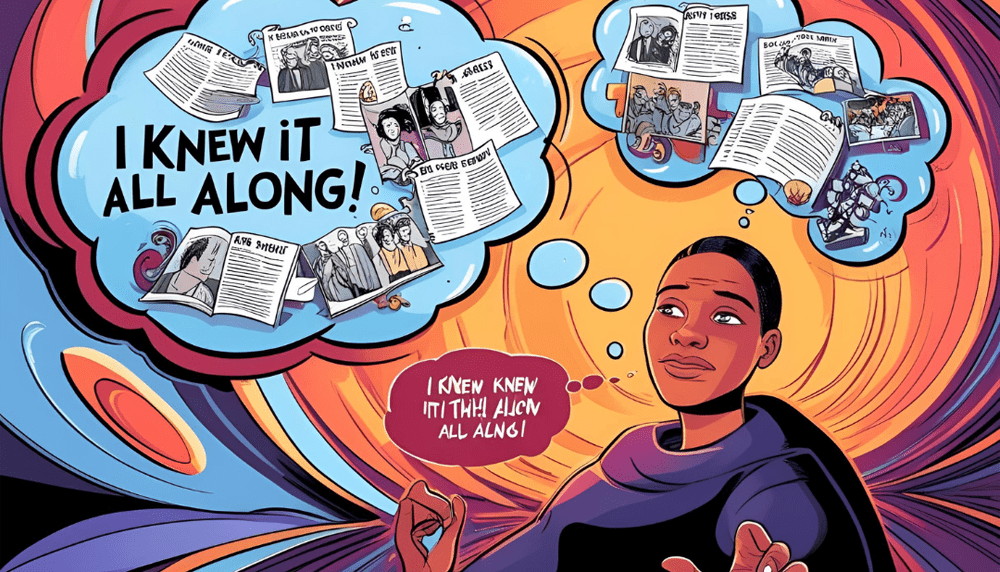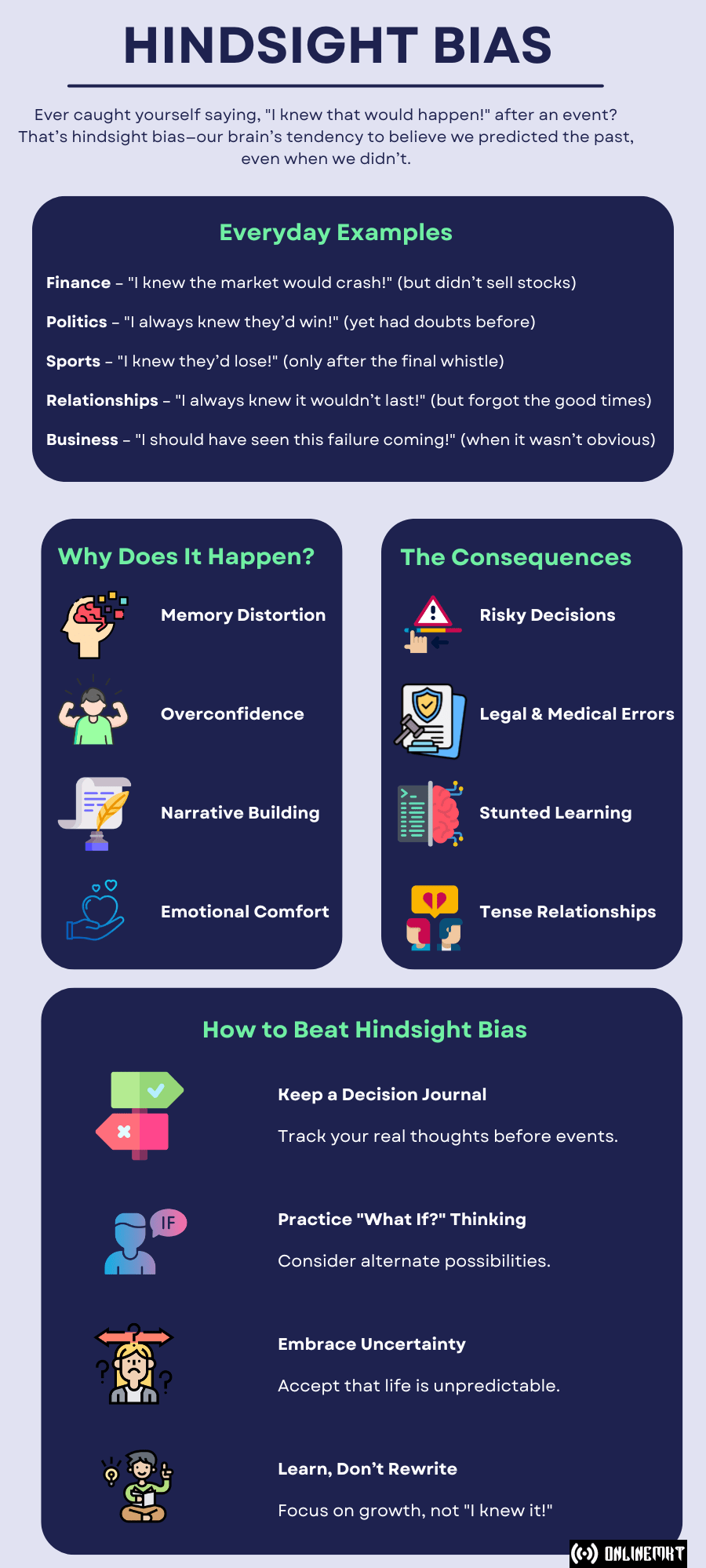Hindsight Bias – Why We Think We “Knew It All Along”

This is how it works: Your favorite team loses a big game. You exhale slowly and say, “I knew they were going to lose!” But did you? That is hindsight bias.
Hindsight bias is the tendency to believe, after an event, that we always knew it would occur. It makes us think we are better at predicting than we actually are.
Why does this matter? Because it informs how we decide, what we learn from failure, and how we judge people. Let’s explore this intriguing psychological phenomenon in more detail.
Hindsight bias occurs because the brain is avid for constructing coherent narratives. Following an event, we retroactively reconstruct our memories to conform to the event’s occurrence.
Psychologist Baruch Fischhoff first studied this in the 1970s. He found that people, when told the outcome of an event, reported that they “always knew” it would happen. This shows how fast our minds rehash history to make sense in the moment.

Examples of Hindsight Bias in Everyday Life
Hindsight bias can be seen in almost every area of life. Here are some examples:
Financial Markets
Suppose a stock market collapse. Later on, investors always comment, “I knew it was going to happen,” though they might not have sold shares or taken action on their “forecast.” Such bias renders them overly confident of their market predictions and hence engage in dangerous decision-making in the future.
Politics
After an election, people claim that they “always knew” the winner would succeed. They block out their former doubts or hunches. For instance, after a surprise election result, voters for the winning candidate begin to alter their memories to believe they were positive all along.
Sports
It is fun to say, “I knew they would win!” after a game. They might have been as unsure as the rest of us before the game. Hindsight bias makes them think they knew what they were doing even when their predictions were based on guesswork.
Business and Product Failures
Entrepreneurs will think about failed business ventures and grumble, “I should have known better.” For example, when a product does not succeed, they might criticize themselves for not expecting the failure, when the outcome was not obvious then.
Personal Relationships
After the break-up, people are apt to say, “I always knew that it would not work.” They ignore the moments of happiness and assurance they had in the past, but only focus on the signs pointing towards the break-up.
Why Does Hindsight Bias Happen?
Hindsight bias is not a bad tendency, but the result of the way our brain works. Let’s find out why:
Overconfidence in Past Knowledge
We prefer to believe that we knew more than we did. Once something has occurred, our mind will fill the blanks so that we will perceive that we knew everything.
Selective Memory and Information Processing
Our minds selectively recall information that verifies the result and overlook information which fails to. For example, once a team wins a match, supporters remember the player’s strong points but forget his weak spots.
The Need for a Coherent Narrative
Humans love stories. We want the world to make sense, even when it is random. Hindsight bias enables us to create a tidy narrative, and we feel like life is predictable and controllable.
Emotional Comfort
The belief that we “knew it all along” gives us a sense of mastery and reduces anxiety. It is comforting to think that we can predict the future, even if we cannot.
Consequences of Hindsight Bias
Hindsight bias is not just simple self-deception – it has real-world consequences:
Poor Business and Financial Decision-Making
Overconfidence in our forecasting abilities can lead to poor investments, strategic errors, and missed opportunities. A CEO, for example, might ignore warning signs because they believe they “know better.”
Legal and Medical Consequences
In legal cases, judges and jurors can overestimate their own capacity to predict outcomes, and therefore deliver unfair verdicts. In medicine, doctors can overestimate their diagnostic competence and ignore the nuance of certain conditions.
Impact on Learning and Personal Growth
Hindsight bias prevents us from learning from mistakes. When we convince ourselves that we “knew better,” we deny responsibility for our errors or attempt to do better.
Dysfunctional Relationships
In relationships, hindsight bias can lead to blame and resentment. For example, after an argument, a person may say, “I always knew you would do this,” and forget their own role in the argument.
How to Overcome Hindsight Bias
While hindsight bias is natural, we can strive to reduce its impact:
Keep a Decision Journal
Write down your expectations, reasons, and predictions before an event occurs. Then, compare your record with what did occur. This helps you realize how often your predictions were wrong and holds you responsible.
Practice Counterfactual Thinking
Imagine various circumstances that could have been there. For example, if something in a project fails, you wonder, “What if it had worked? What would have led to the opposite outcome?” This brings out the complexity of the problem.
Acknowledge Uncertainty
Accept the fact that not everything is definite. Just remember that the universe is random and that even experts are not able to know all things. Before you make a decision, seek the opinions of others who may have a different view. This challenges your assumptions and prevents overconfidence.
Learn from Past Mistakes
Instead of saying, “I knew it all along,” ask yourself, “What can I learn from this experience?” Consider how you can improve next time rather than re-writing history.
Conclusion
Hindsight bias is the nature of being human. It makes us feel intelligent and capable but at the same time, may lead to reality-denial.
By recognizing this bias, we can make wiser choices, learn through experience, and embrace the unpredictability of life. Next time you catch yourself saying, “I knew it all along,” slow down and reflect. Did you really?
Take a look back at your own hindsight bias experiences. What are your stories and impressions? Share them in the comments!